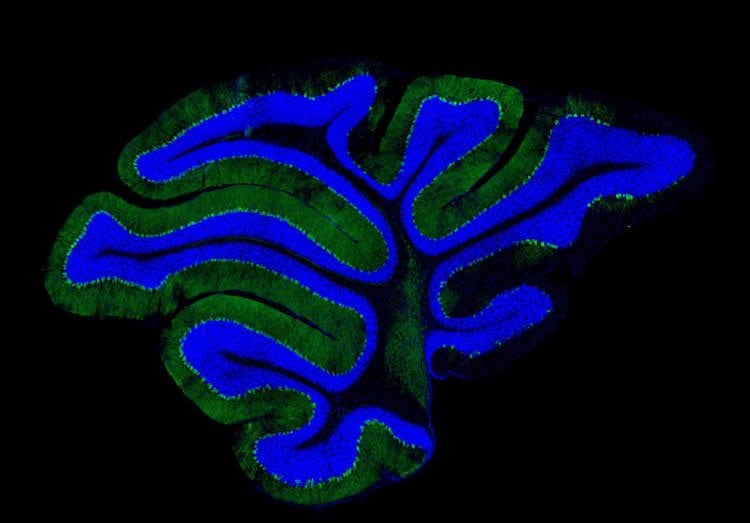Summary: Dysfunction of the Golgi apparatus is associated with axatia and developmental delays.
Source: University of Manchester.
Disabling a part of brain cells that acts as a tap to regulate the flow of proteins has been shown to cause neurodegeneration, a new study from The University of Manchester has found.
The research, which was carried out in mice, focused on the Golgi apparatus — a compartment inside all cells in the body that controls the processing and transport of proteins. It is fundamental for the growth of the cell membrane and also for the release of many types of proteins such as hormones, neurotransmitters and the proteins that make up our skeletons.
Working with Chinese colleagues, the Manchester researchers examined the role of the Golgi apparatus in neurons, or brain cells, and found that mice in which the apparatus was disabled suffered from developmental delay, severe ataxia, and postnatal death.
Ataxia is a term for a group of disorders that affect co-ordination, balance and speech. Any part of the body can be affected, but people with ataxia often have difficulties with balance and walking, speaking, swallowing, tasks such as writing and eating, and vision. It can be inherited, brought on through incidents such as a stroke, or through old age.
Although the function of the Golgi apparatus, named after its Italian discoverer, is well understood, it has not been previously been shown to have a role in neurodegeneration. With these results the scientists think they may have found a new avenue to explore in the search for the causes of some neurodegenerative diseases.

Professor Martin Lowe, the lead researcher, said: “Our results, combined with previous work, suggest that during the cellular changes that occur, loss of the Golgi function could be an important intermediary step that contributes to cell death.”
How much the Golgi apparatus contributes to the major neurodegenerative diseases such as Alzheimer’s or Parkinson’s is something that is currently unclear, though other studies have made this link.
Professor Lowe added: “Together with other published work our findings suggest that in certain neurodegenerative diseases the loss of function of the Golgi apparatus may contribute to the pathology that is occurring.”
The study was carried out by The University of Manchester and the Shilai Bao lab at the Chinese Academy of Sciences in Beijing.
Funding: Funding was provided by a Joint grant between The University of Manchester and the Chinese Academy of Science at Beijing, as well as separate funding to both institutions, from the BBSRC and the National Natural Science Foundation of China.
Source: Jamie Brown – University of Manchester
Image Source: NeuroscienceNews.com image is credited to The University of Manchester/Martin Lowe
Original Research: Full open access research for “Loss of the golgin GM130 causes Golgi disruption, Purkinje neuron loss, and ataxia in mice” by Chunyi Liu, Mei Mei, Qiuling Li, Peristera Roboti, Qianqian Pang, Zhengzhou Ying, Fei Gao, Martin Lowe, and Shilai Bao in PNAS. Published online December 27 2016 doi:10.1073/pnas.1608576114
[cbtabs][cbtab title=”MLA”]University of Manchester “Turning Off the Protein Tap: New Clues to Neurodegenerative Disease.” NeuroscienceNews. NeuroscienceNews, 8 February 2017.
<https://neurosciencenews.com/golgi-apparatus-neurodegeneration-6086/>.[/cbtab][cbtab title=”APA”]University of Manchester (2017, February 8). Turning Off the Protein Tap: New Clues to Neurodegenerative Disease. NeuroscienceNew. Retrieved February 8, 2017 from https://neurosciencenews.com/golgi-apparatus-neurodegeneration-6086/[/cbtab][cbtab title=”Chicago”]University of Manchester “Turning Off the Protein Tap: New Clues to Neurodegenerative Disease.” https://neurosciencenews.com/golgi-apparatus-neurodegeneration-6086/ (accessed February 8, 2017).[/cbtab][/cbtabs]
Abstract
Loss of the golgin GM130 causes Golgi disruption, Purkinje neuron loss, and ataxia in mice
The Golgi apparatus lies at the heart of the secretory pathway where it is required for secretory trafficking and cargo modification. Disruption of Golgi architecture and function has been widely observed in neurodegenerative disease, but whether Golgi dysfunction is causal with regard to the neurodegenerative process, or is simply a manifestation of neuronal death, remains unclear. Here we report that targeted loss of the golgin GM130 leads to a profound neurological phenotype in mice. Global KO of mouse GM130 results in developmental delay, severe ataxia, and postnatal death. We further show that selective deletion of GM130 in neurons causes fragmentation and defective positioning of the Golgi apparatus, impaired secretory trafficking, and dendritic atrophy in Purkinje cells. These cellular defects manifest as reduced cerebellar size and Purkinje cell number, leading to ataxia. Purkinje cell loss and ataxia first appear during postnatal development but progressively worsen with age. Our data therefore indicate that targeted disruption of the mammalian Golgi apparatus and secretory traffic results in neuronal degeneration in vivo, supporting the view that Golgi dysfunction can play a causative role in neurodegeneration.
“Loss of the golgin GM130 causes Golgi disruption, Purkinje neuron loss, and ataxia in mice” by Chunyi Liu, Mei Mei, Qiuling Li, Peristera Roboti, Qianqian Pang, Zhengzhou Ying, Fei Gao, Martin Lowe, and Shilai Bao in PNAS. Published online December 27 2016 doi:10.1073/pnas.1608576114






